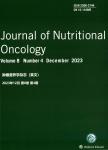Management of Malnutrition in Liver Cancer Patients with Chronic Liver Diseases
Management of Malnutrition in Liver Cancer Patients with Chronic Liver Diseases作者机构:Asad Dajani Specialist Center Sharjah United Arab Emirates Semey State University Semey Kazakhstan The Ninth Peoples Hospital Shanghai Jiaotong University Shanghai China Abu Hammour Medical Center Dubai United Arab Emirates
出 版 物:《Journal of Nutritional Oncology》 (肿瘤营养学杂志(英文))
年 卷 期:2016年第1卷第1期
页 面:21-29页
学科分类:1002[医学-临床医学] 100214[医学-肿瘤学] 10[医学]
主 题:Liver cancer Malnutrition Liver cirrhosis Hepatic encephalopathy Nutrition assessment Nutrition intervention Cancer therapy
摘 要:Liver cancer is the fifth most common cancer and the third leading cause of cancer death globally. Malnutrition is found in 65-90% of patients with liver cancer and often enhances cancer occurrence and complications, deteriorates liver functions, and promotes early development of refractory ascites and hepatic encephalopathy (HE), increasing both morbidity and mortality. Malnutrition may develop as a result of poor dietary intake, anorexia, medications, side effects to chemotherapy, encephalopathy, as well as socioeconomic limitations. A dedicated clinical team should provide proper assessment of patient’s nutritional status and nutrition supplemental plan to restore liver health and prevent or treat malnutrition. Nutrition assessment is based on medical, nutritional, and medication histories, physical examination for body composition and signs of malnutrition, anthropometric measurements, radio-imaging, laboratory tests, and flow charts or algorithms on patient’s dietary intake and changes in bodyweight. Clinical management depends on patient’s disease and nutritional status. Patients with minor liver affection or compensated liver cirrhosis may have normal diet without any restrictions in carbohydrates, proteins, and fat, but preferably take other supplements supporting the liver. Patients with decompensated liver should consume 25-40 kcal/kg/day and 1.0-1.5 g protein/kg/day. For patients with acute episodes of HE, a temporary protein restriction of 0.6-0.8 g/kg/day should be implemented until HE is eliminated. Patients should consume small, frequent meals throughout the day and add a carbohydrate- and protein-rich evening snack. Other approaches to supporting optimal digestion and nutrition and managing side effects of cancer therapies may be added as well.



